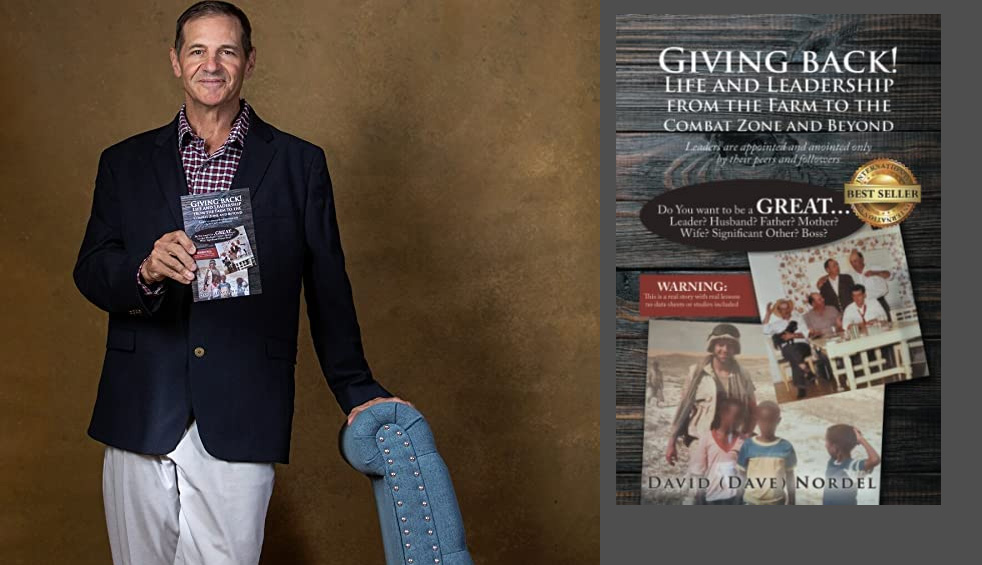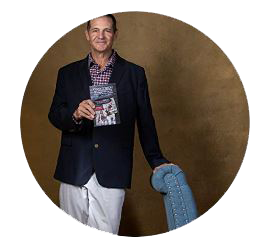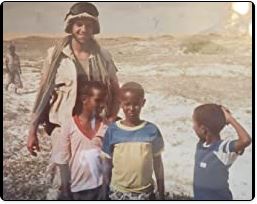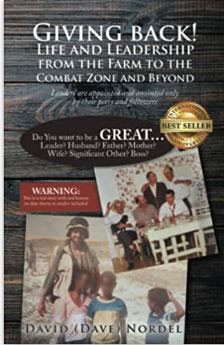Thought Leadership Studio Podcast Episodes:
Interview with David Nordel, Author of Giving Back!
Episode 25: Master Storyteller David Nordel Weaves an Engaging Spell of Powerful Leadership Lessons.

#authors, #insight, #inspiration, #interviews, #motivation, #storytelling, #thoughtleadership, #thoughtleadershipexamples, #writing
Or Click here to listen or subscribe on appWhat this episode will do for you
- Get inspired by principle-centered leadership expert David Nordel.
- Learn about centering on immutable principles as values, even when it's tough.
- Gain further insights on leadership through David's engaging stories.
- Learn David's perspective on self-assessing and calibrating your own internal compass of principle-centered leadership.
David Nordel, proprietor of the Max Fab state of leadership
David is the author of Giving Back! Life and Leadership from the Farm to the Combat Zone and Beyond: Leaders Are Appointed and Anointed Only by Their Peers and Followers. He is a retired United States Air Force Command Chief Master Sergeant, RN, and emergency manager. As a medic, David developed the Maximum Fabulous organizational attitude, leading to a 99.5% survival rate.
David's "One Man With a Plan" website is onemanoneplanmt.com and he is @davenordel on Twitter.
When you're reflecting, when you're sitting back and saying, "Hey, what can I do better as a leader?" Or "Am I doing well as a leader?"
Self-evaluation. You should do a little bit of that. You should always fight for feedback too.
Run back to where what you value, what you want your people to value, whatever it is in your organization. It might just be quality, it may just be an A+ product. If you value that, then is everything that you're demonstrating the same way?
-David Nordel
Curated Transcript of Interview with David Nordel.
The transcript is lightly edited for clarity and is a partial transcript- the full interview is on audio. Click here to listen.
Chris McNeil: I'm Chris McNeil, host of Thought Leadership Studio, and I'm here with Dave Nordel, author of Giving Back - Life and Leadership from the Farm to the Combat Zone and Beyond.
Welcome, Dave.
 David Nordel :Hey. Thanks brother. Chris, I appreciate you having me on. You know, we had a little chat here before we started, and, I hope this resonates with the audience. I'm excited to go through some stuff here. So let's go.
David Nordel :Hey. Thanks brother. Chris, I appreciate you having me on. You know, we had a little chat here before we started, and, I hope this resonates with the audience. I'm excited to go through some stuff here. So let's go.
Aligning with Values When it's Tough
Chris McNeil: Let's go. You have some empowering stories to tell. What is one of your most powerful stories as a reference experience for your own personal values?
Something that really is meaningful to your experience ... that changed your life in a positive way ...and it still stands as a pillar inside of you that you draw strength from?
David Nordel: Sure. This is actually in the book. Great question, by the way. To tell a little bit about me, I did 30 years in the military and I retired at the highest enlisted ranked possible. And as being a command chief, master sergeant, you're in charge of the morale, welfare and supplying and equipping and training of, you know, thousands of people. You do that in conjunction, usually with a general officer, and whatever your mission set is. I grew up on a dairy farm in California, in the middle of nowhere, and so hence the (references to) farm life. I think everything that you need to know in life, you can learn on the farm if you pay enough attention. And the book does a lot of corollaries of times when I was young and things I saw on the farm and how that directly translated into my leadership life ... to include building empathy, discovering people, and learning how to ask questions, be inquisitive and try to put myself in other people's shoes so that you can lead in a really diverse, inclusive way.
Those things are all important. And so I've had a lot of opportunities: good, bad, and in some pretty austere situations to be able to really affect people's lives in a thoughtful way.
And so you asked that question and you kind of get down to core values, right? And so let's talk about that and then I'll give you the example.
Great core values are a lot of things too ... when you walk into an institution, or as the leader, you're leading ... you're leading a company, or you're just in leadership position, and you look on a wall and it's either framed or it's on a plaque or it's on a cool little banner, and it, and it's got a logo. We're going to talk about flags here in a minute. It's got a logo or a flag, and in there, there's words.
And those words sound like fun, integrity, honesty, or, you know, those two are congruent, they are customer focused. Those are things, right? Those are things or attitudes or those type of things, but they're really two dimensional. And so your core values, the things that you carry around every day, the things that you say, right - Which is what your people hold you to - have to be three dimensionalized appropriately. So I'll give you an example.
I'm a registered nurse. I put myself through nursing school, as I went through my medic time and, you know, I started as a medic and we'll talk a little bit about my combat time and my medical experiences, and this is one of them. Through my journey, I went to what was called Advanced Medical School... it's like the third year of medical school.
And they teach you how to take care of your own patients, run your own pharmacy, you run your lab, you run your x-ray, and it's sometimes that's all on a backpack. And you're out in the middle of the jungle with people, and you're "it" - you are the doc and they call you the doc. And sometimes this is on a mountaintop in the middle of nowhere, guarding nuclear weapons, or it's out in the jungles of South America, doing drug interdiction and those type of things. And those are two examples of things that I did. So the Air Force core values that I grew up with were integrity, service and excellence: integrity, first, service before self, and excellence. And all you do, those are words, right? And they're powerful words. Those are powerful words because when you talk about excellence, you have to define that.
And as a leader, you have to thoughtfully define what each of your core values are. But boy, you gotta live them, Chris. You have to live them. Cause people hold you to that. If they see you deviate from that, then all of a sudden your standards start to drop.
Chris McNeil: Oh yeah.
David Nordel: So when you pick a core value - and I'm going to talk about integrity here in a minute - when you pick a core value and you decide that that's going to be what you live by, like integrity, that's tough. We struggle every day, as we just go from here to the grocery store and back you, you told me you just finished walking the dog. You make certain decisions just when you're walking the dog and how you cross the street. And do I go down to the crosswalk? Can I cross right here? Just because there's no traffic coming.
 So I'm on a mountaintop in Turkey. It's the beginning of Desert Storm, the very first Gulf Gulf War. It's the beginning of Desert Storm. I'm with 125 Americans out in the middle of a Turkish base. So 125 Americans, Turkish city of about 500,000 people on a Turkish base, which was a great assignment, by the way. It's the holiday time, it's Christmas time. I'm the medic, I'm the doc, and I'm on actually on call. There was two of us there. So, no beer, no wine. I've got my stethoscope in one hand and if somebody needs something, I'm there to take care of it.
So I'm on a mountaintop in Turkey. It's the beginning of Desert Storm, the very first Gulf Gulf War. It's the beginning of Desert Storm. I'm with 125 Americans out in the middle of a Turkish base. So 125 Americans, Turkish city of about 500,000 people on a Turkish base, which was a great assignment, by the way. It's the holiday time, it's Christmas time. I'm the medic, I'm the doc, and I'm on actually on call. There was two of us there. So, no beer, no wine. I've got my stethoscope in one hand and if somebody needs something, I'm there to take care of it.
Well, one of my guys was sick. He had a kidney infection. And that's a serious thing in men, you know. And so I took him down, I took him down to my aid station. I did the exam on him, did the labs on him and everything. And I knew he had a kidney infection, needed some antibiotics. Well, the way the job worked was that required a phone call to a physician. So this place, this other base that I would call had three physicians - two young guys who were great and an older physician that was actually the commander. He was the leader of the organization- a beloved leader of the organization.
Well, on this night, he happened to be on call. So we talked about it, started the treatment on the individual.
But he asked me to send him to his base to take a look at him for a couple of days. So I did that. So in the morning I got him started on everything and I sent him off and he went down and he came back and he was better. And he was very appreciative. Well, the next day he shows up with his supervisor and his supervisor says, "I want you to listen to his story because it doesn't sound right."
So this young man just starts to describe to me the physical examinations that he went through while he was down with this colonel. And it sounded like sexual assault to me, Chris, now I'm a young guy, I'm probably barely 30. And, the medicine that I was practicing was like being the plankton in the sea of medicine. I didn't have a medical degree, you know, a certificate that made me a doctor, or pa, or a nurse practitioner. But our type of medicine was congruent with those things.
And so I had three things cross my mind. One was I could have said, "I'll take care of it", made some phone calls, kind of got a feel for what was going on and went from there. I could have made it a little bit more official and called one of his fellow docs and said, "What's going on?" Or I could've reported it.
Well, the the first two are a lot easier. The third one's the right way. So I chose the right way to do it. It's the integrity way. It's living the integrity piece. So, we reported it and went back down to the base, the investigation starts and this thing blows up.
The two younger docs I had this great relationship with - they were training me, they were learning from me, I was learning from them. It just was this, it was wonderful. We were doing really, really good stuff for a lot of people, helping people and just getting them in the right place. And that relationship in a matter of about 24 hours turned sour. And I got attacked and I got told what I didn't know. And I got told I was young and I got told to be careful and be careful what was said and who I said it to. And basically berated almost like "take it back".
The place where I was at, the non-medical people kind of rallied around me because I was their doc. I took care of them. They rallied around me. So that's some support. But in the exterior world out there, in my medical world, you know, in a young career, I took a beating.
It was pretty brutal. Well, this went on for a couple of months and then the investigating officer called me from this other base and he said, "Dave, I need to tell you something." He said, "We're far enough into this investigation, I can let you know and we're probably going to need your help." But he said, "Since you've raised this issue, people have come out of the woodwork, men and women that have had the same experience and we're going to charge the colonel."
And so that colonel was charged and he was actually flown to Germany to a higher military court and prosecuted and sent to prison. None of that was easy, Chris. It sounds noble. And the story's not in the book to sound noble. It really has nothing to do with me.
The title of the chapter is "Make the tough call". So, when you ask that question and you edge in on integrity, that one always pops straight to my mind. Because that was one of the more difficult things that I had to do professionally as a leader. I was in a leadership position. You know, when you're in medicine, especially in the military, but when you're in medicine ... it just amazed me, once I started taking care of patients, I can tell you things like, take off all your clothes. I'll be back in five minutes, and I want you to touch your toes five times and you won't even think twice about it. You'll just do it. You may think it's crazy. I made you touch your toes five times and I probably will explain it to you, but you'll do it ahead of time just because of that intrinsic trust.
Self Evaluation as a Leader
David Nordel: So as leaders, when you're reflecting, when you're kind of sitting back and saying, Hey, what can I do better as a leader? Or am I doing well as a leader? Self-evaluation.
And you should do a little bit of that. You should always fight for feedback too. Boy, run back to where what you value, what you want your people to value, whatever it is in your organization. It might just be quality, it may just be an A+ product.
If you value that, then is everything that you're demonstrating the same way? So don't want an A+ product that has no grease on it, that all the stitching's done. Whatever it is. Right? Don't want that A+ product and have people walk into your office and you've got a hole in your chair and the arms are all worn out and you know, you have to have an a+ environment to set that standard. So I hope that helps.
Immutable Principles as Values
Chris McNeil: It does. And I think your story to me is a great example of a value that's in alignment with a higher principle. You know, people have all kinds of values, and some of our values are more like archetypes of greater principles. And integrity, to me, is one of those.
I think it's a great example of how acting in accordance with these higher principles that you value is not about the external reward, because sometimes it will be the exact opposite of that.
David Nordel:Yeah. You'll see in the book that at the end of each chapter, I write little one-liner thoughtful kind of just "seeds" - I call them "nuggets", just little nuggets. And the one thing that I write in there is the right way is sometimes the hard way, and it's lonely. And that's okay. That's okay because on the back end you've got to come out on the right end of that.
So, yeah, integrity, the word meets the principle of integrity, which is the three dimensional actionable piece of that, which is a big deal.

The Intrinsic Rewards of Leadership
Chris McNeil: Well, it unfolds through stories because it's a lot to grasp with just a word. But when you unpack it and ask, "What are my personal rules for living up to this principle?" - in this case, integrity. "How do I know that I'm living up to that? And how would I know if I'm not?"
So you create this internal compass, and it's not about the external reward, although that tends to come eventually, but that's not why we do it. It's, to me, one of the intrinsic rewards of leadership. And that's part of my personal mission, to awaken more of the intrinsic rewards of leadership.
And you've shown a lot of that from what I'm seeing, and I haven't read your book yet, I'm going to, but I've seen reviews of it and people love the storytelling. They love the conciseness of Giving Back!, right?
And so give us another example of a story that resonates with a, a principle that you hold.
Cleaning Blind Spots from the Windows of Perception
David Nordel: Well, you don't know what you don't know. So you need to find out, Chris, and this is in the book too. And I probably need to rewrite this chapter and even get a little bit more detail...
When we navigate through life, we have a prism, right? And we operate through that prism. And sometimes we don't even realize that It's that we navigate through a straw. We're a little bit myopic, and we should just based on the way we look (at things), the way our parents taught us, who we grew up with, what was in our environment - we are naïve, right? Right. And so it's the Johari window, if you're familiar with that. If not, it's worth looking up.
 But, there's the things that you know about yourself that nobody else knows.
But, there's the things that you know about yourself that nobody else knows.
And there's the things that other people know about you that you don't. And then there's the stuff that you don't know and nobody else knows. And so as you navigate through life, your, your aperture gets wider, whatever it is, raising kids, buying a house, a new job, going to college, all of those things kind of broaden us. Well, I think this development of empathy and respect are so foundational to everything we do. But in a thoughtful leadership way, it should be always in the forefront of your mind. This is not a tool that you pull out when you need it. This is not one of those counseling tools. Or "I'll be more empathetic", or "I'm high directive" or "more supportive". It's not a tool, it's not a leadership tool. It is a leadership trait.
It's a human trait that if you want to retain your people and you want people to be happy, and you want people to trust you, and you want people to be integral, doing things the right way when you're not there, they have got to understand two things: Nobody cares how much you know until they know how much you care about them. So that's a caring thing, which lends to respect, which means you have to respect where they come from. So Dave leaves home at 19 after, you know, working on the farm and goes in the United States Air Force. And so Dave takes his, his jokes, his vocabulary, his prism of the world, his background. I grew up in a Portuguese and Mexican community. Most of the Mexicans were migrants. They were illegals at the time. And I worked side by side in the field with them and grew up with them, went to church with them, did all those type of things.
And a very strong Portuguese community. I'm an immigrant, a fourth generation immigrant from Portuguese. So, that was my foundation. That's what I knew.
Well, I show up in a barracks in San Antonio, Texas in basic training. And the majority of the people in my barracks are either from upstate New York or in city Philadelphia. So Chris, and this is in the book- One day, they made me a student leader. I guess they saw some leadership in me way back when they made me a student leader. So I'm leading these 12 guys, get them through basic training, get them to eat on time, dress right, do all the things, you know, help out the training instructor. And we were having trouble getting out on time, and a guy was having trouble making a bed. And so we're struggling with it.
We're working together, we're being a team, we're struggling with it. And he's on one side and he's on the other. And we really needed to go. And he says, I can't get this done. I can't get the bed made. And I turned to him. And in my perfect vernacular that I grew up with, I threw the N word in there, said, not "Jerry Rig", but" N Rig', totally oblivious to all of that. And went on about my business. Well, I got a visit. ... I got a gift from two older guys. They were Army guys coming into the Air Force. And they came and sat down with me and they, they said, "What's your problem?"
And I said, "Well, I don't have a problem." T And they said, "You know, this is how this is perceived."
Suspending Preconceptions and Learning
David Nordel: And Chris sitting there on my bunk, and just before Christmas of 1984, I made a promise to myself that if I didn't know something, I was going to go find out. And I have put myself in the most uncomfortable situations, you know, and on purpose, to learn about people. And so as a leader, when you're hiring people and they come from all walks of life and they have different marriage issues and kid issues and they bring all the baggage from their formative years and psychology things, We'll talk, you know, if we have time, we'll talk a little bit about my PTSD. But, but they come from all different walks of life. And so as I put it in the book, you can look across the room, Chris, at somebody, just, let's say it's a, it's an extremely obese woman.
You can stand 25 feet away from her and make these assumptions. "She's lazy", "She eats too much". "She's got a variety of other problems." You can just label her however you want to land or you can go up and say, "Hey, how you doing?" And start a conversation. And in five minutes, not ask why she's overweight just in five minutes, just by showing some interest. Find out that she used to be a model and she can show you a magazine cover, but since she's had this rare form of cancer, which kills her metabolism and she can't process food, she's gained 150 pounds. Whole different perspective, right?
Whole different way of leading, whole different way of accommodating, all of those type of things. And so if we don't operate in the core environment on an everyday basis as leaders in a thoughtful manner, if we don't operate from that level of respect and understand if you don't know something, doggonit, go explore it to the point where you can actually build some empathy. You might find out that you're right and that's fine. But I will tell you, odds are you going to find out something you didn't know and it's going to change your perspective.
Chris McNeil: I love this and I'd like to feed back a couple parts, both as an advocate for the listener and from an analysis standpoint. And, also just to confirm it, part of this is having a growth mindset. That life is about growth. Life is about learning.
Part of it is about shedding the skin, so to speak, of our conditioning that we (accumulate as we) grow up and we build ideas of what the world is, and who we are that are given to us by other people. And these are nothing but ideas. But we act on them structurally as if they're the world ... until and unless we start to question our own beliefs, question our own model of the world, question how we look at things.
And part of that is heart-centered, it's caring about other people so that we have a powerful reason ... Again, a principle that can be a value. When we value that principle of caring about others - brotherhood, sisterhood, humanity, whatever we want to call it, that gives us an impetus for a reason to shed the skin of our old beliefs by questioning how we think about things.
Diversity Brings Growth
David Nordel: Yeah. And you need help if you surround yourself with people that lend some diversity, that care about you in the same way that you care about them. Boy, everybody just starts growing. And you can have some really difficult conversations without emotion, without anger. And they have that type of stuff just to put you in a thoughtful way. Yeah. That introspection's huge.
Chris McNeil: And it seems like you see leadership partly as living up to holding universal principles as values (my words there), right? So that you're a model of those values for your people. And isn't that more powerful than what you "tell them to do"?
David Nordel: Sure.
 Well, the telling, the directing, the "here's what we're going to do today, here's how we need to get this stuff done." That just becomes innocuous communication within an organization when they look at you and they're always wanting something.
Well, the telling, the directing, the "here's what we're going to do today, here's how we need to get this stuff done." That just becomes innocuous communication within an organization when they look at you and they're always wanting something.
Sometimes when I speak, Chris, most times when I speak, to one or two people in the room... I speak to a lot of geriatric millennials, you know, these almost 40 somethings now. And, almost always, somebody in the in the room will peel off and grab me, and then phone numbers are exchanged and they stick with me. They text me and we talk and they want advice on things. And it's because of that. Because, by the time I'm done talking, the barriers are all gone. They cry a little bit and they can say, "I'm a girl in a guy's world" and "I'm having trouble climbing the ladder."
And I truly appreciate that because, we far too often, I think as leaders, we think that we're leading people to get a product produced - whatever that is, it's not, when you get put in a leadership position.
Your product is the people....
.............
The transcript is lightly edited for clarity and is a partial transcript- the full interview is on audio. Click here to listen.
***************************************
Free Stuff and Offers Mentioned in Podcast
***************************************